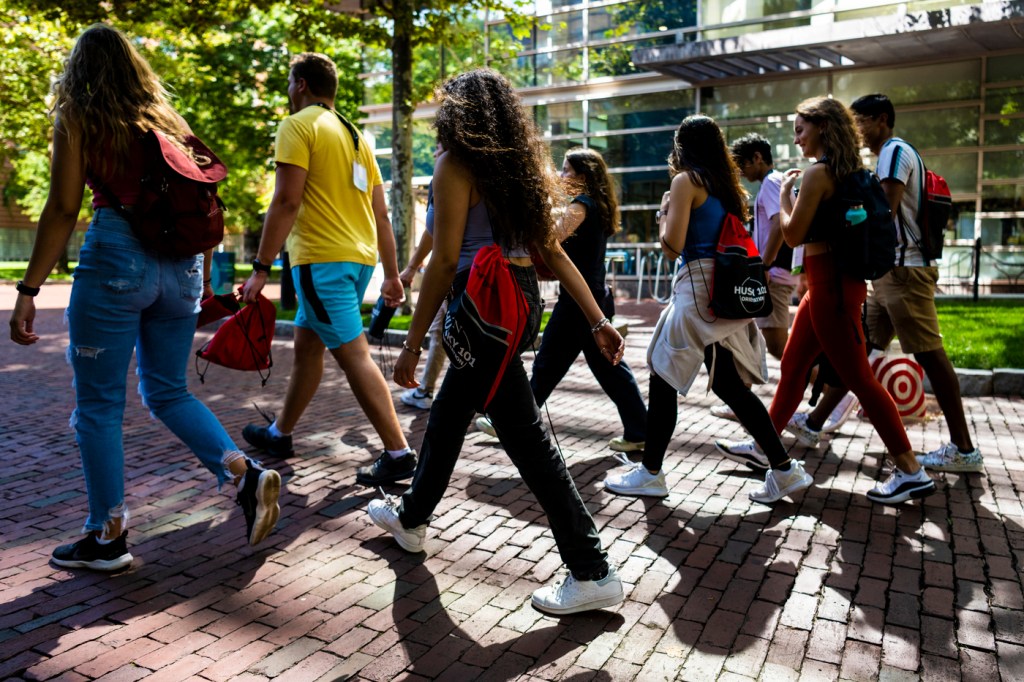Northeastern invests $450 million in financial aid, expands opportunities for global mobility

Northeastern University will provide $450 million in financial aid for 2023-24, including a record $437 million for undergraduate students.
Today, 63% of undergraduate students at Northeastern receive financial aid, including merit scholarships and need-based grants.
Because of the steady increase in undergraduate financial aid in recent years—$47 million more this year than 2022-23—the average debt that undergraduate students carry after graduating from Northeastern has dropped by 36% over the past decade.
“Meeting full demonstrated financial need is critical in attracting students from all walks of life,” says Satyajit Dattagupta, chief enrollment officer at the university. “This results in a classroom setting where students bring diverse ideas and push the status quo.”
Northeastern is increasing its investment in undergraduate financial aid at the same time that the university is experiencing unprecedented demand. A record 96,620 students applied for the fall freshman class of 2,600 seats.
Northeastern’s global university system is now making it possible for undergraduate students to start their Northeastern journey in three different locations: Boston, London and Oakland. Applicants using the Common App can now select, and rank in order of preference, among Northeastern’s three undergraduate campuses. Northeastern’s global university system now comprises 13 campuses in the U.S., Canada and the U.K.
The newest class of Northeastern undergraduate students is academically talented and diverse. While standardized test scores are no longer required for prospective students, the average two-part SAT score for next fall’s class is 1493, and the average high school GPA is 4.3.
Undergraduate tuition for 2023-24 will be $62,000, which represents an increase of 4.9% from the prior year. This figure does not take financial aid into account.
Full demonstrated financial need for every student
Northeastern is committed to meeting the full demonstrated financial need for every student who attends Northeastern, and has been doing so for every freshman and transfer student since 2015-16.
Demonstrated financial need represents the difference between the cost of attendance and a student’s expected family contribution, or ability to pay that cost. Demonstrated need is calculated based on several factors, including family income, once a student has filled out the Free Application for Federal Student Aid, or FAFSA.
Undergraduate students are also covered by the Northeastern Promise, a compact that guarantees eight semesters of funding for students who receive need-based financial aid from the university. Under the Promise, need-based grant funds automatically increase at the same rate as tuition and are guaranteed not to decrease.
Northeastern students are participating in experiential learning programs in 148 countries and seven continents, including Antarctica. They work in full-time co-op positions across multiple industries, ranging from small startups to large multinational corporations, including some of the most in-demand employers in the world. Experiential learning opportunities also include educational experiences such as the faculty-led Dialogue of Civilizations program.
“Northeastern’s commitment to providing an unparalleled experiential education continues to resonate with families all over the globe,” Dattagupta says.
Because of the breadth and depth of their experience, Northeastern students have an advantage in the job market: 97 percent of graduates are employed or enrolled in graduate school within nine months of graduation.
‘Focus on career exploration, exposure and preparation’
Guidance counselors and advisers to high school students are recommending Northeastern to their high-achieving students and families who are increasingly focused on outcomes.
Katie May is the associate director of college counseling at Sonoma Academy in Santa Rosa, California. She says many of her students are drawn to Northeastern because it provides a unique integration of classroom experience and professional experience.
“Northeastern has expanded the definition of what the undergraduate experience can encompass,” May says. “Northeastern’s focus on career exploration, exposure and preparation is a particular draw for students today.”
More than ever, May says, high school students and their families are asking if a college degree is a good return on their investment.
“When you look at Northeastern’s outcomes, its job and graduate school placement statistics, that’s an easy question for most students and families to say ‘yes’ to,” May says.
What May appreciates most about Northeastern is that its commitment to experiential learning and an expanding global footprint hasn’t come at the expense of the foundational educational experience.
“Given how much of a draw the practical, experiential components are, it would be easy to solely focus on and allocate resources in those areas,” May says. “But Northeastern has maintained a solid commitment to the other equally important components of a traditional college experience.
“They haven’t lost sight of the value of the classroom experience, interdisciplinary learning, student-faculty relationships, and many other paradigms of the U.S. college experience.”
David Nordman is executive editor of Northeastern Global News. Follow him on Twitter @davenordman.

